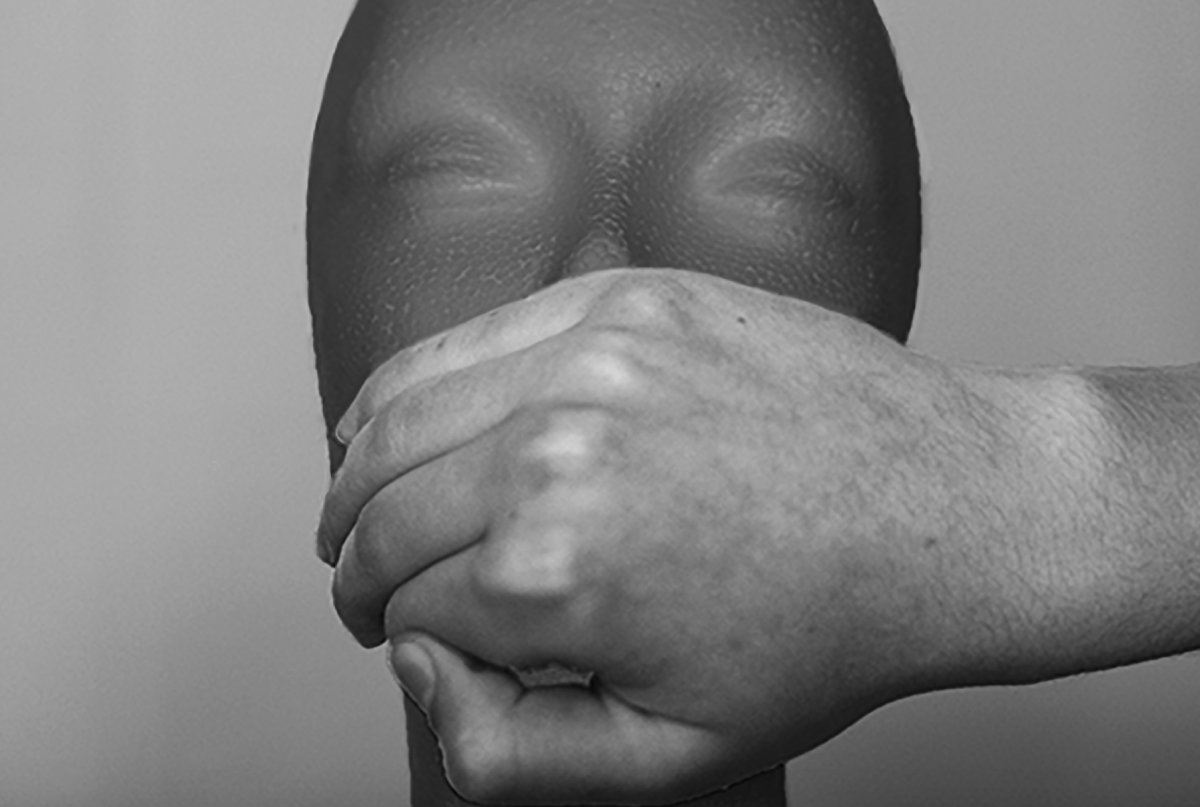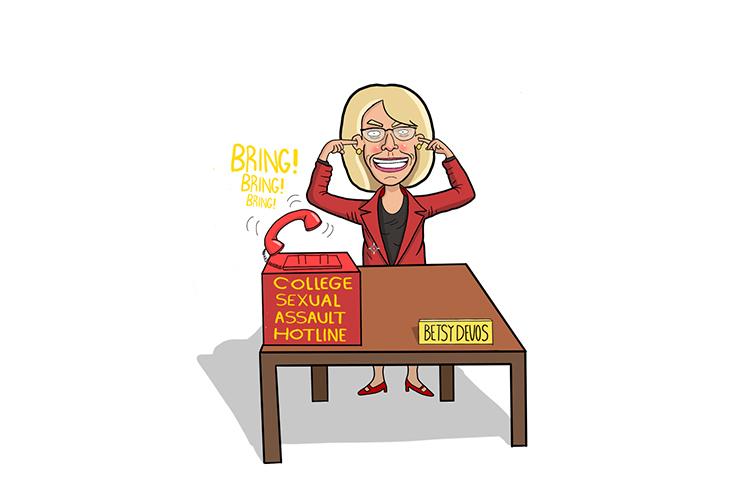
MADISON CAESAR
SCHOOL RESOURCE OFFICER
What happens when an incident is reported to you? What is the course of action from there?
So my job from there is to talk to both parties and kind of piece the stories, exactly what occurred and you know, the location. Then I forward that on to the Sex Crimes Unit detectives. I’d say the more severe something is, then the detectives follow up on it … What we want to eliminate is me interviewing that kid and then someone else interviewing them because it is a traumatizing event. We try to get all the information we can, because district attorney determines whether they are going to prosecute. And within our time frame, which is 84 hours, if a sexual crime has happened, we would hope that the victim has not taken a shower so that they can go to the hospital and get a sexual assault kit, where the doctors test and they look for any signs of forced rape.
How do you think that the requirements after the incident can be traumatizing?
Because now, you are taking their sheets and their clothes and sometimes people might misinterpret it as like, ‘Well I didn’t do anything, I’m the victim,’ and I say, ‘You are right but this is evidence here that we need to collect.’ I think the whole ordeal is very traumatizing from start to finish. Even after we go to court and let’s say there is somewhat of closure if they prosecute the person, you could never have full closure because you can never take back what happened.
What is the effect of receiving these reports personally?
It is very hard. I hate having to make them relive this and I try to do the best that I can and assure them that, ‘Hey this is not your fault, so don’t blame yourself,’ and that is the biggest thing we are taught … There is no victim blaming. Someone decided to take advantage of you and we’re here to write this down. Just seeing that person’s face is a hard thing for any officer to do.
What does it look like to not have enough evidence?
If you said something happened maybe like a year ago, and then let’s say, you were never able to go to the hospital to follow up. You never called the police, there were no witnesses or no one saying, ‘Oh yeah I saw those two together.’ Not to say it didn’t happen, it’s just hard to say that, yes, someone actually saw those two in the same room at the same time … If I can’t determine that you guys were in the same place, or sometimes people are like, ‘I don’t even know that person,’ maybe I’ll try to check phone logs.
Are there any systemic errors that can get in the way of a perpetrator not receiving justice?
Whether it is rape or murder or any type of crime, we ask as many questions as possible and are very detailed because cases can get tossed off for one error. Let’s say someone was drinking that night and they failed to mention this to the officer or to the attorney when they were going to court, and then it comes up while they are in court on the stand … That changes the whole outcome of how the case is looked at, what the defense attorney will say is, ‘Oh well, you were trying to hide something,’ because that is their job, to protect the other person. What I’ve seen with high school kids is that they were scared to report the assault because they thought (they) were going to get in trouble for the other activities that were going on. And it’s my job to say, ‘No, I’m not here for that, I’m here because you’re now a victim of sexual assault.’
Is there anything else you want to add?
I just want to say, we kind of need to think about the decisions we make. We’ve had similar situations where people put themselves into bad situations. No means no without a doubt. But sometimes, we have to think about, ‘Okay, do I really need to go to this party on a Friday night? My mom already said no and I’m going to have to sneak out. I know they’re gonna have alcohol and maybe some marijuana there. Maybe I shouldn’t put myself in these situations.’
We followed up with Officer Caesar after considering his answer to the previous question, as it contradicted some of his earlier points, specifically regarding victim blaming.
In our last interview you said something along the lines of trying to help people think about the situations that they put themselves in?
We never want to blame the victim, but also we need to be smart adults about that, right? So for instance, you don’t want to go to someone’s house at one o’clock in the morning or something like that … It is victim blaming and I’m sorry to say that, but it is also knowing to be responsible too and trying to not put yourself in a situation that could end up bad. There are some things that you don’t have control over, but you do have control over putting yourself in certain situations … It still sounds like I am pointing the finger, but like I said we have to be aware of where we put ourselves and I am pretty sure your parents wouldn’t want you hanging out at a party, like that you know with drugs and alcohol … We can all make better choices no matter what we do … With sexual assault, it is a hard one because no means no, no matter what, right? But we can all be aware of the times and places that we go do certain things.
What is your definition of victim blaming?
My job as a police officer is to educate people that there are bad people out there, so victim blaming, in my personal opinion, wouldn’t be saying, ‘Well, hey if you never went to that party then this wouldn’t have happened, you shouldn’t have ever went there.’ (But) I have to educate you that, ‘Hey, sometimes at these parties where there are drugs and alcohol bad things can happen, so maybe in the future you should go to a party that is supervised by parents.’ So it is in your delivery and how you present it, and also showing empathy for the person and not just totally blaming them.
Interview by Nora Janowski
Photo by Leah Marchello

PETER JANCI
SEXUAL ABUSE ATTORNEY
What do you do?
I represent victims of child sexual abuse and adult sexual assault. My firm is based here in Portland and I’ve been doing that for 12 years. We handle cases involving abuse that happens in connection with larger institutions like schools, churches, youth organizations, private schools, boarding schools and universities.
Is there anything other than evidence that determines whether the police decide if it can be prosecuted?
District attorneys make the decision whether to prosecute. In a perfect world, that decision is made based on the evidence alone. Has there ever been a situation where a district attorney has decided not to prosecute for other reasons? I’m sure that has happened just knowing human nature … but I think the vast majority of the time the decision is made based on the evidence.
Could you explain what the criminal versus the civil side is?
The district attorney is responsible for the criminal side and his job is to prosecute the perpetrator for what they did against that victim, not necessarily to pursue what the victim wants him to do. He or she might prosecute a case even if a victim decides that they don’t want to prosecute. On the criminal side, all they can achieve is putting the bad guy in jail. On the civil side what we can achieve is compensation for our clients in terms of monetary compensation, but through our process we can also make change in an organization.
What does it mean to have enough evidence?
On the criminal side, the standard of proof to convict someone is much higher than it is on the civil side. The prosecutor has to prove their case beyond a reasonable doubt. On the civil side, the standard of proof is different. It is what they call a preponderance, which means that there is a 51 percent chance that the assault happened. When we are pursuing lawsuits on the behalf of victims, it’s a different standard of proof than when a prosecutor is trying to convict them and send a perpetrator to jail.
Are there any systemic errors that contribute to why perpetrators can go unpunished?
Well I’d say that the statutes of limitations are a systematic error. There’s really not a lot of good reasons for short statutes of limitations, especially in the world we live in today, so I think that’s probably a big one. And I think that a lot of cases are decided by juries which are just made up of people from the community, so if people don’t have a good understanding (of) sexual assault and consent and the impact of these things, then when they sit on a jury and make decisions on these issues they can sometimes get it wrong.
Is the process of reporting different if you go through a school? For example, if a victim contacted a counselor or administration and reported it that way.
Well, employees at schools are mandatory reporters of child abuse and sexual assault and so they should (report) if they learn that information. They have a legal obligation to report it either to the police or to Child Protective Services. So telling somebody at your school should trigger involvement from the authorities.
Do you think that the justice system does a good job of convicting perpetrators?
Well, I think we are doing a better job. I think there is still a lot of sexual assault and sexual abuse that goes unpunished and a lot of perpetrators that do not face criminal accountability for what they do. I think that people are becoming more and more aware of that. I think that our country is taking steps to try and make the laws stronger and hold these people accountable. So I think it is improving, I think we have got a long way to go though.
Interview and photo by Nora Janowski











































